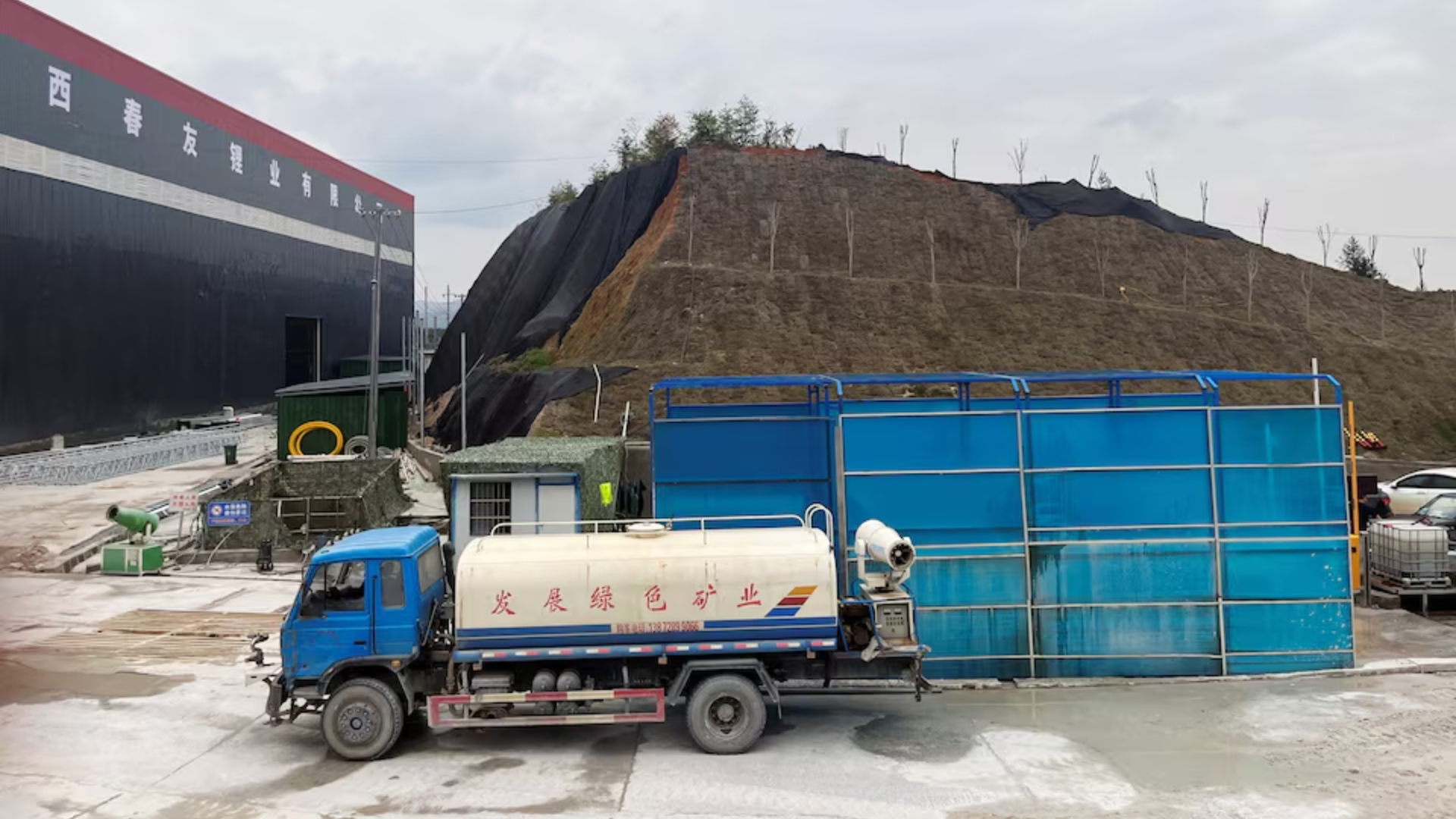Summary
- Global lithium prices down over 80% in past 12 months
- Rystad slashes China’s mined lithium output growth forecast
- Analysts expect mining of lepidolite in China to be hit
- Almost half of China’s lithium output in 2023 came from lepidolite, Fastmarkets says
BEIJING, (Reuters) – A slump in the price of lithium, a key raw material in electric car batteries, is dragging on China’s mining of the ultralight metal which together with a costly extraction process is prompting a reassessment of output growth and new project plans.
Softening EV demand has knocked down global lithium prices, with a basket tracked by Benchmark Mineral Intelligence plunging more than 80% in the past 12 months. That has already forced many producers worldwide to shutter production and cut jobs.
In China, which accounted for about a quarter of the world’s mined lithium output in 2023, analysts expect the mining of lepidolite – a hard rock ore that is relatively expensive for producing lithium – to take a hit as a prolonged price slump makes costly production unsustainable.
“Lepidolite mining and new projects in China and worldwide are taking a big hit from prices, while other types of lithium mines that provide some relative cost advantages, especially brines in South America, will keep on a fast-growing pace,” said Susan Zou, a vice president at Rystad Energy.
The consultancy has slashed its forecast for China’s mined lithium output growth in 2024 to about 12% from 54% previously, mainly due to the lepidolite slowdown. Globally, it now expects 27% growth in mined lithium output, down from 42% previously.
Almost half of China’s lithium output in 2023 came from lepidolite, pricing agency Fastmarkets said, adding volumes of the ore more than doubled over the past two years to 114,500 metric tons of lithium carbonate equivalent (LCE).
It costs about 80,000 yuan ($11,120) to 120,000 yuan to process a ton of LCE from lepidolite in China, while it costs around 40,000 yuan and 60,000 yuan to get the same volume from brine deposits and spodumene, respectively, analysts say.
That undermines the economics of lepidolite mining in China, where softer EV demand and a supply glut have pushed down spot lithium carbonate prices to around 100,000 yuan from peaks near 600,000 yuan in November 2022.
Five China-based analysts forecast spot prices will stay in the 100,000 yuan to 120,000 yuan range in 2024 or rise slightly higher, despite a futures rally boosted by restocking demand after the Lunar New Year holiday.
‘MARKET IS REALLY BAD’
China ranks fourth in lithium reserves. Beijing has been pushing for more investment to ramp up mining to meet demand from the battery sector and to cut its reliance on imports.
Much of that investment has been in the southern province of Jiangxi, home to some of the newest lepidolite projects that are rich in kaolinite, a clay mineral with lower lithium content that costs around 120,000 yuan per ton of LCE to produce, according to research firm CRU.
Such projects include EV battery giant CATL’s vast new Jianxiawo mine and Yongxing Special Materials Technology’s Huashan mine.
CATL won exploration rights for Jianxiawo in April 2022 with a bid of 865 million yuan, according to the government of Yichun, the provincial mining hub.
“Projects including the Jianxiawo mine are facing negative margins and very high risk of production curtailment,” said Yin Yiwei, a senior CRU analyst.
CATL and Yongxing did not immediately respond to emails seeking comment.
Market speculation that CATL had suspended production at Jianxiawo sparked a rally in shares of Australian miners last month, but CATL said at the time that operations were normal.
“The market is really bad. Producers in Yichun are trying to survive with higher costs and poor prices,” said a mining expert working for a major company in Yichun.
A survey of 11 Jiangxi lithium carbonate producers published by Mysteel on Feb. 28 found widespread production suspensions in February.
Yan Yun, secretary of the Yichun committee of China’s ruling Communist Party, acknowledged the city’s lithium battery sector had been hit by falling prices and a supply-demand mismatch.
“But we still believe the industry has great prospects,” he told the official Jiangxi Daily, as the global auto industry moves towards an electric future.
Li Liangbin, chairman of Ganfeng Lithium, a major Chinese miner that produces mostly from spodumene, sees a role for lepidolite.
“Lepidolite, due to its relatively high costs and large volumes, is a flexible variable and can help keep supply, demand and lithium prices balanced,” he said.
($1 = 7.1941 Chinese yuan)
Reporting by Siyi Liu, Andrew Hayley and Beijing Newsroom; Editing by Tony Munroe and Himani Sarkar











